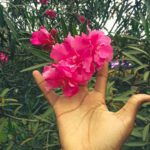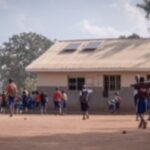Earlier this month, I traversed the Karamoja sub-region on a documentation assignment for a client. Some of the districts I encamped were Napak – now making headlines for the famine that is ravaging its humble citizens and Kaabong.
I interviewed a Primary Seven pupil who comes to school with her one-year-old child and her mother. At 1 p.m., the trio feed on a cupful of boiled maize grain mixed with beans – roughages – she called them.
That one cup is their breakfast and lunch. When they return home, she looks around for anything green and prepares that as supper, without any accompaniment – just chlorophyl. As someone who knows fully well how hard it is to sleep on a grumbling stomach, I bent the rules and gave this child mother some upkeep that hopefully kept her and her child full for a few days.
Back at my hotel, I pondered deeply about the food I leave on the plate every lunch and what it would mean for a 7-year-old whose stomach hasn’t interacted with anything for two days. I recalled the avalanche of people that flocked into Bismillah Restaurant in Kaabong town to eat the food that one of my colleagues couldn’t eat because “the chicken they served poorly cooked and that the pilau tastes like it was made when Semei Kakungulu was hopping town to town planting his trees.” That plate of pilau chicken was empty before any of us could blink.
I remembered that Thursday morning at Lomuno Primary School when kids gathered with their cups at break time hoping to get their usual dose of maize porridge only to be turned away at the kitchen because the school didn’t have any flour left in store.
Juxtaposed with the lavish life I encounter daily in Kampala where patrons drink till they drop, despise kikomando just because and joke that they can’t drink black tea because water is for cows, I wonder what happened to Ubuntu? Where is the love? Why don’t we do a GofundMe to purchase food and nutrition supplies for children in Karamoja? If I suggested that you forego that third meal of the day and serve it to Josephine in Amudat, would I have asked too much?
But besides the magnanimity, there are deeper questions to probe. For example, why is it so hard for the Ministry of Disaster Preparedness to predict this annual recurring famine in Karamoja and plan for it ahead of time? Why is there no deliberate effort from the Agriculture Ministry to provide food silos in Karamoja so that in times of good harvest, some of it is kept for harsh periods? Where is the Uganda National Meteorological Authority in times like these?
How is it that a country with half of its land able to support crop production and with more than 70% of her population engaged in agriculture still unable to feed her people to their full, worse case, at least give them a meal a day?
How is it that a region so endowed with natural wealth; borders both Kenya and South Sudan, has a base of almost all international aid organisations still unable to harness this potential? Is the slow development in Karamoja indicative of the mindset of the settlers there or is it a deliberate government effort to keep the region at rock bottom?
These are questions neither of us can provide answers for today. What I can tell you, however, is that the famine in Karamoja is not so much because the region is semi-arid but rather product of a dysfunctional country with misplaced priorities.
If we take urgent climate actions as basic as planting tree, we will not be writing articles like these in years to come but it will be foolhardy to think that Karamoja’s hunger problem is their problem alone. Sooner, the hungry will stop being reasonable about it; only then we will realise that we are in this together.
Img Src: Ihsaan Haffejee – Anadolu Agency
This post was created with our nice and easy submission form. Create your post!






